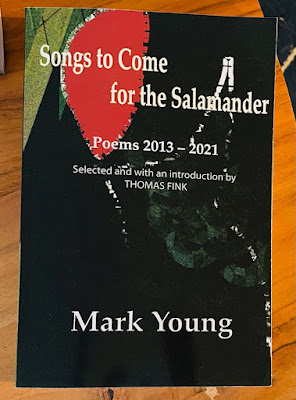I'm delighted to share that Meritage Press, with co-publisher Sandy Press, has released
Songs to Come for the Salamander: Poems 2013-2021 by Mark Young
(Selected & With Introduction by Thomas Fink)
Co-published with Sandy Press (2021)
Price: $27.75
Order through Meritage Press (MeritagePress@gmail.com) and
Amazon
I hope this necessary book will be of interest to you! Meanwhile, here's some info about it:
from the Introduction by Thomas Fink
Some readers might assume that particular, highly pessimistic generalizations in Young’s poems are actually Mark Young presenting his sense of doom. The little ditty "democracy" registers the claim that "no-one// knows the/ words to" the "song" (the concept of democracy) even though "every-/ one sings" it, and "since violence is learned" tells us that "tolerance is no/ longer available, is replaced by trauma." Although nothing in the poems—not even such affirmations of aesthetic transport as "Constant Craving," which speaks of music "that acts as/ axis to steady everything around"—makes one identify the poet as a bright-eyed optimist, various moments in the work display too much respect for the complexity of cause and effect, limitations of human perception, the transience of trends, and sudden appearances of the unexpected to place sustained credence in large generalizations and foregone conclusions.

